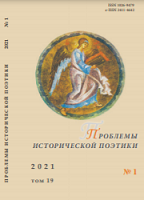Пьянство как грех в творчестве Ф. М. Достоевского
Excessive Drinking as a Moral Transgression in the Work of F. M. Dostoevsky
Author(s): Evgeniia S. KuikinaSubject(s): Christian Theology and Religion, Studies of Literature, Ethics / Practical Philosophy, Russian Literature, Substance abuse and addiction, 19th Century
Published by: Петрозаводский государственный университет
Keywords: Dostoevsky; excessive drinking; reveling; ancient and Christian traditions; Plato; the Gospel;
Summary/Abstract: The article studies the topic of excessive drinking in the works of F. M. Dostoevsky in the light of the tradition of the ancient feast, or symposium. The wine offered at a symposium did not merely incline people to philosophical conversations and discussions about eternal questions, but also revealed the inner human essence, thoughts and intentions. There is ancient understanding of wine as a means of forgetting sorrows and attaining temporary joys. Excessive drinking is associated with the ancient Dionysian idea - excessive drinking at the festival of Dionysus, and the concept of metamorphosis - people lose their human essence and begin to resemble animals. In the fates of the heroes of Dostoevsky’s Poor Folk, Humiliated and Insulted, Notes from Underground, Crime and Punishment, Demons, The Brothers Karamazov, the ancient tradition is combined with the Christian understanding of a feast as reveling, and amusements at a feast, and excessive drinking as a moral transgression. On the pages of Dostoevsky’s magazine Citizen excessive drinking is equated to a serious illness, a flood, a fire, an enemy invasion, that is, to a catastrophe that affects the Russian people. The ancient tradition allows to reveal additional meanings in Dostoevsky’s interpretation of the topic of excessive drinking.
Journal: Проблемы исторической поэтики
- Issue Year: 19/2021
- Issue No: 1
- Page Range: 239-257
- Page Count: 19
- Language: Russian

